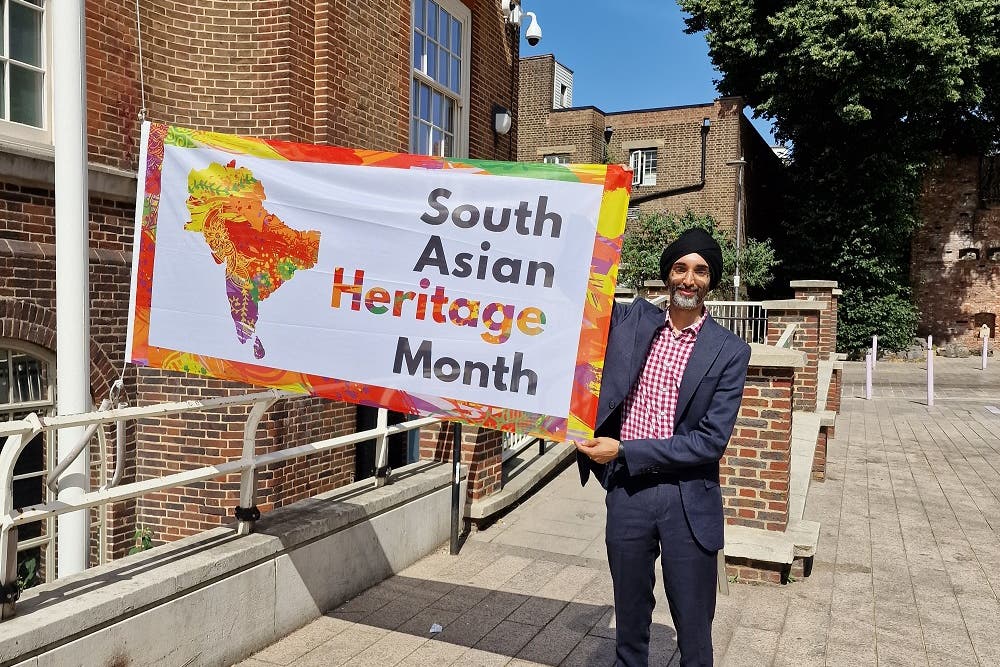South Asian Heritage Month co-founder wants event to challenge stereotyping
South Asian Heritage Month falls between July 18 and August 17.

The co-founder of South Asian Heritage Month (SAHM) hopes the “celebration of South Asian identity” helps “challenge much of the stereotyping, misogyny, racism and other forms of discrimination which exists within society”.
Jasvir Singh is one of the co-founders of SAHM – alongside the South Asian Heritage Trust – which falls between July 18 and August 17 and focuses on the histories of countries including India, Pakistan Afghanistan, Nepal, Bangladesh, Sri Lanka, Bhutan and the Maldives.
Summing up the month in a handful of words, the barrister, 42, told the PA news agency it is a “celebration of South Asian identity”.
He added: “Our motto is to celebrate, commemorate and educate.
“The celebration aspect is an obvious one, the commemorating aspect is to do with the importance of the dates.
“July 18 is the date that the Independence of India Act gained Royal Ascent in 1947, and August 17 1947 is the date that the Radcliffe Line was announced, which said where the border was going to be between India and the newly formed Pakistan.
“The education aspect comes from the fact that the months allows us to openly talk about what ‘South Asianness’ means to us in the present day, but we are also not forgetting the past.”
He said he is “indebted to some of the other months that exist”, which inspired the creation of SAHM.
“Black History Month is a good example, as is Pride Month, all these are months which have come before us and we’ve been inspired by, but we’ve used them as a blueprint to help us talk about South Asian heritage and identity,” he said.
Mr Singh reflected on setting up the month in 2019, alongside Binita Kane, a consultant respiratory physician in Manchester, over a cup of chai.
“2017 was the 70th anniversary of the events of 1947, namely the independence of India, creation of Pakistan and Partition, and in that year it felt that there was a real sense of South Asians wanting to reclaim their identity and also be educated on what our collective history was,” he said.
“(Binita and I) met up in December 2018 and we were talking over a cup of chai and said, how can we make sure that the momentum which was very clear during 2017 isn’t lost and how can we make sure we’re not just focusing on Partition?
“That’s where SAHM came into fruition.”
Each year since the month has been in existence, there has been a different theme, with this year’s being “stories to tell”.
“It’s a theme that anyone can engage with,” Mr Singh said.
“Personally, I’ve spoken about my own life, I’ve spoken about being a married gay Sikh man and that’s my story, but what I want to know is what everyone else’s stories are.
“They might even want to share their parents’, grandparents’, their friends’ stories – people that they feel should be given a spotlight.”
He added that submissions for stories will be shared on the Trust’s website, with many already expressing an interest in taking part, which is a “beautiful sign” of what is to come.
Reflecting on embracing his roots growing up, Mr Singh said that his “South Asianness” has “always been a part of my identity”.
“I haven’t known an identity where I wasn’t both British and South Asian,” he said.
“The national anthem would come on TV and my family would laugh because I’d stand up and at the same time, I was very clearly South Asian.
“I would go to the Gurdwara every weekend, I was speaking in a bilingual family – in Punjabi and in English.
“As time has gone on, I’ve realised that there is a need for other people to perhaps appreciate the same sense of identity, of history, of culture as I’ve had the opportunity to.”
Asked about moments which can be classed as steps forward for the community, he said: “It would be remiss of me to not mention the fact that we have our first ever non-white Prime Minister, and he’s of a South Asian heritage.
“That doesn’t mean to say that everyone is going to share his political views, but it is the acknowledgment that South Asianness has become more apparent within society.
“CBeebies are also going to be doing a bedtime story for SAHM with the first British cricketer in a hijab, which will be the first time it has been done.”
He added that there is also a “long way to go”, however.
“There needs to be a lot of education done to challenge much of the stereotyping, misogyny, racism and other forms of discrimination which exists within society”, he said.
“Not every South Asian wants to become a lawyer, doctor or accountant, not every South Asian female is disempowered by her family.
“Milestones are certainly present as well, but we can’t just focus on the milestones and be complacent – there’s still a lot that needs to be done.”
Bookmark popover
Removed from bookmarks